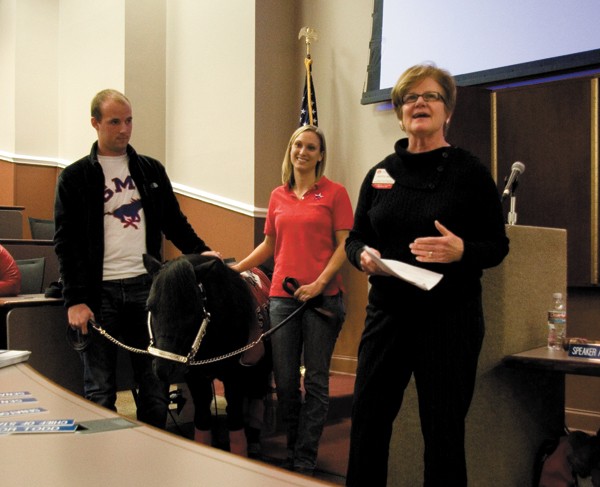
(Brooks Powell/The Daily Campus)
The SMU student senate passed a resolution Tuesday naming Peruna, the black Shetland pony, SMU’s official mascot, ostensibly ending the controversy over the two new horses given to the university by philanthropist Madeleine Pickens.
Senate Membership Chair Jack Benage and Senator Jake Torres, a Peruna handler, said they were concerned a potential change in the mascot was not brought before the students and the greater SMU community.
To encourage passage of the resolution, the Department of Recreational Sports brought the live mascot, Peruna VIII, and his stuffed analog to the floor of the Senate.
Numerous individuals spoke in favor of the piece, including SMU class of 1944 alumna Francis Ware.
Ware’s family has had a tremendous impact on SMU, including facilitating its founding. Her grandfather Stephen J. Hay II, mayor of Dallas from 1907-1911, lobbied Dallas citizens to buy the bonds necessary to build the first building on campus, Dallas Hall, as a tribute to their generosity.
Ware, a former SMU student body secretary, said Peruna has been taken for granted.
“Peruna is really more than a mascot – he’s an icon,” Ware said. “An icon is not a real thing, you know, but it represents the real thing perfectly. And that’s our spirit.”
Judith Banes, executive director of Recreational Sports, also shared a variety of anecdotes about Peruna from her years as an SMU student.
The resolution passed with 32 votes for and three votes against.
The senate also passed a bill that is intended to address allegations of misconduct on the part of SMU Police in fraternity houses.
According to the legislation, SMU officials, including police officers, will be barred from entering fraternity houses unless invited between 8 p.m. and 6 a.m. seven days a week.
Senator Matt Neman, a member of Pi Kappa Alpha, said police are not looking for students who may be in medical distress because of alcohol consumption, but are seeking out and citing students for the slightest infractions of SMU alcohol policies.
Neman said he and fellow Greeks have witnessed countless examples of police patrolling the halls of fraternity houses during evening hours and entering student rooms without probable cause.
“We have cops knocking at our doors at all hours of the night,” Phi Delta Theta President Kyle Bennett said.
SMU Interfraternity Council President Haynes Stroder, speaking on behalf of all nine IFC fraternities, said he believes the increase in police activity is driving student drinking underground and forcing students out of fraternity houses.
Bennett said fear of police intervention has led to a change in the culture in fraternity houses.
“When you walk up and down our hallways now, all the doors are locked,” Bennett said. “It’s not an open door policy where everyone’s hanging out and having a good time – it is a completely closed, locked environment.”
SMU Police Chief Rick Shafer said the police department is being proactive in addressing crimes that take place on campus. He acknowledged that students have rights as private citizens, adding, “We’re not there to violate those rights.” However, he said the resolution before the senate would be a hindrance to police doing their jobs if passed.
“We can’t measure how much … crime we’ve deterred because we’re just walking down the hall,” Shafer said. “Maybe it’s a crime that’s going to occur to you, we don’t know.”
Shafer reassured senators that the only time searches of rooms occur is if a warrant is obtained, or if SMU Residence Life and Student Housing officials decide that an “administrative search” is necessary.
In a vote of 22 in favor to seven against, with four abstentions, the senate passed the resolution, although at this time, no timeline has been established for implementation of the new policy.
Senators also approved two additional pieces of legislation. The first encourages the IFC to require all men living in IFC fraternity houses to take the “Training for Intervention Procedures,” or TIPS, course and to become a part of the new “Mustangs Who Care” program.
The second piece encourages faculty to utilize the Blackboard course software to make syllabi available to students before the first day of class and to post students’ grades online within one month of an assignment being turned in.









